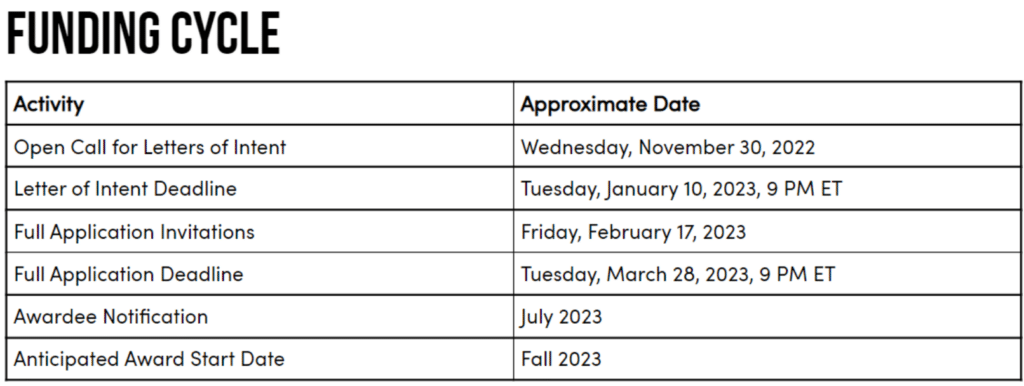Researcher Update: November 2022
November 8, 2022
In this month’s Researcher Update you’ll find information on:
- RSVP for CURE Epilepsy’s Reception on December 4th at the AES Annual Meeting
- Letter of Intent Submission Opens Wednesday, November 30th for CURE Epilepsy’s 2023 Taking Flight and CURE Epilepsy Awards
- Register for the NIH/NCATS Workshop “The Quest for Innovative Molecular Treatment Modalities for Intractable Disease Targets” Taking Place November 17-18, 2022
- Sign Up for an NINDS Biomarker Webinar to Learn More About Funding Opportunities
- Apply Now for a Postdoctoral Diversity Enrichment Program (PDEP)
- Register for the Hybrid Neuroscience 2022 Event “The Neural Exposome and Why it’s Important to You!”
RSVP for CURE Epilepsy’s Reception on December 4th at the AES Annual Meeting
Join CURE Epilepsy leadership and fellow dedicated researchers in honoring our newest grantees during our reception on December 4th at the 2022 American Epilepsy Society Annual Meeting. Light refreshments will be served.
The reception will be held:
- Sunday, December 4 from 6 – 7:30 pm
- Location will be available shortly
- Check our website for updates!
We look forward to seeing you all!
Please note, this is not an official event of the 2022 AES Annual Meeting, nor is it sponsored or endorsed by AES
Letter of Intent Submission Opens Wednesday, November 30th for CURE Epilepsy’s 2023 Taking Flight and CURE Epilepsy Awards
Submit your Letter of Intent for our CURE Epilepsy and Taking Flight awards starting Wednesday, November 30th. All Letters of Intent are due by Tuesday, January 10, 2023, at 9 pm ET.
The Taking Flight Award seeks to promote the careers of young epilepsy investigators to allow them to develop a research focus independent of their mentor(s).
The CURE Epilepsy Award reflects CURE Epilepsy’s continued focus on scientific advances that have the potential to truly transform the lives of those affected by epilepsy, with prevention and disease modification as critical goals.
Key priority areas for both awards include: 1) basic mechanisms of epilepsy, 2) acquired epilepsies 3) pediatric epilepsies, 4) SUDEP, 5) treatment-resistant epilepsies, and 6) sleep and epilepsy.
We look forward to seeing your submissions!

Register for the NIH/NCATS Workshop “The Quest for Innovative Molecular Treatment Modalities for Intractable Disease Targets” Taking Place November 17-18, 2022
Registration is now open for the NIH/NCATS Workshop “The Quest for Innovative Molecular Treatment Modalities for Intractable Disease Targets” to be held virtually on November 17-18 from 11 am – 4 pm ET. Members of the extramural scientific community, government agencies, health care providers, industry, and the public are invited to share their perspectives with the goal of identifying pain points for developing treatments against targets traditionally considered intractable to current methods of drug discovery.
Sign Up for an NINDS Biomarker Webinar to Learn More About Funding Opportunities
The Neuroscience Biomarker Program is dedicated to advancing biomarkers for neurological disease and is focused on supporting research to promote biomarkers that will improve the quality and efficiency of Phase II clinical trials and clinical practice. An interactive Q&A webinar will be held for interested applicants on Thursday, November 10, 2022 at 2:00 pm ET. All investigators who are interested in learning about the NINDS Biomarker funding opportunities are encouraged to participate.
Apply Now for a Postdoctoral Diversity Enrichment Program (PDEP)
Apply by January 18, 2023 for this Postdoctoral Diversity Enrichment Program (PDEP) that provides a total of $60,000 over three years to support the career development activities for underrepresented minority postdoctoral fellows in a degree-granting institution in the United States or Canada whose training and professional development are guided by mentors committed to helping them advance to stellar careers in biomedical or medical research.
Register For the Hybrid Neuroscience 2022 Event “The Neural Exposome and Why it’s Important to You!”
Be part of this event either in-person in San Diego, CA or dial-in remotely on November 15, 2022, from 6:30 – 9:30 pm PT. Many neurological disorders have complex etiologies that include noninheritable factors, collectively called the neural exposome. The National Institute of Neurological Disorders and Stroke has developed a new office with goals to advance our understanding of the multiple causes of neurological illness. This satellite event will feature a panel of experts to discuss neural exposomic research, its impact on health inequities, and why this is important to you.







